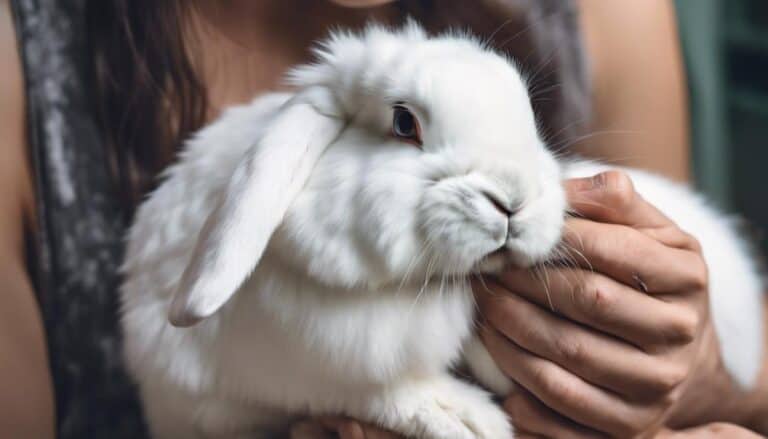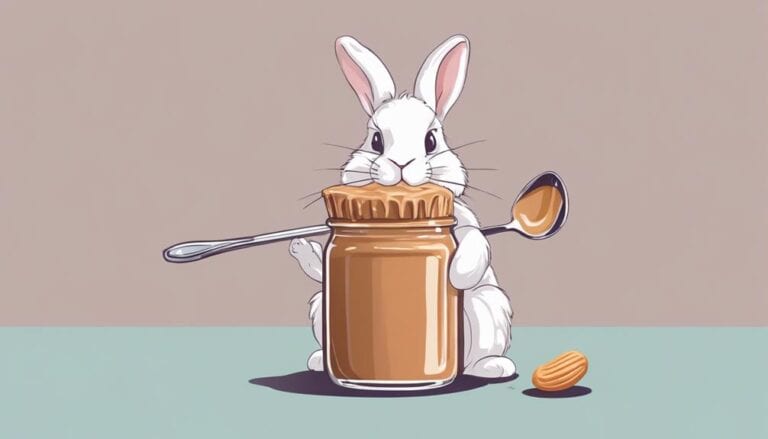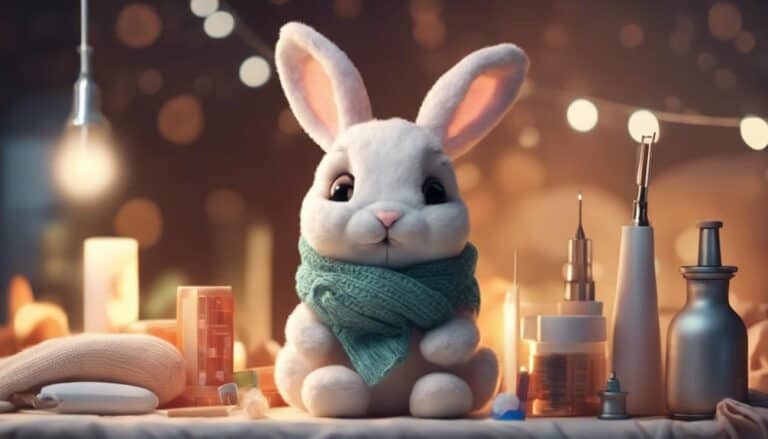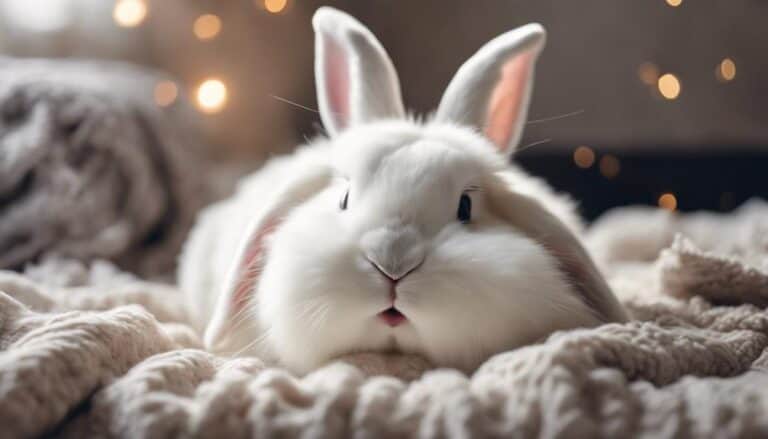Did you know that bunnies have a natural instinct to chew, but can they chew on cardboard?
While cardboard can be a suitable option for your bunny to gnaw on, there are certain considerations to keep in mind to establish their safety and well-being.
Stay tuned to discover the dos and don'ts of letting your fluffy friend indulge in their cardboard-chewing habits, and learn how this simple material can play a significant role in your rabbit's life.
Contents
- 1 Key Takeaways
- 2 Bunny Behavior and Cardboard Chewing
- 3 Safe Types of Cardboard for Bunnies
- 4 Potential Dangers of Cardboard Consumption
- 5 Alternatives to Cardboard for Bunny Chew Toys
- 6 Recommended Rabbit Chew Toys
- 7 Tips for Managing Bunny Chewing Behavior
- 8 Is It Safe for Bunnies to Ingest Cardboard While Making Dust Bunnies?
- 9 Frequently Asked Questions
- 10 Conclusion
Key Takeaways
- Bunny chewing on cardboard promotes dental health and mental stimulation.
- Use plain, untreated cardboard to prevent harm from chemicals.
- Monitor cardboard consumption to avoid digestive blockages and injuries.
- Provide diverse chew toy options to keep bunnies engaged and safe.
Bunny Behavior and Cardboard Chewing
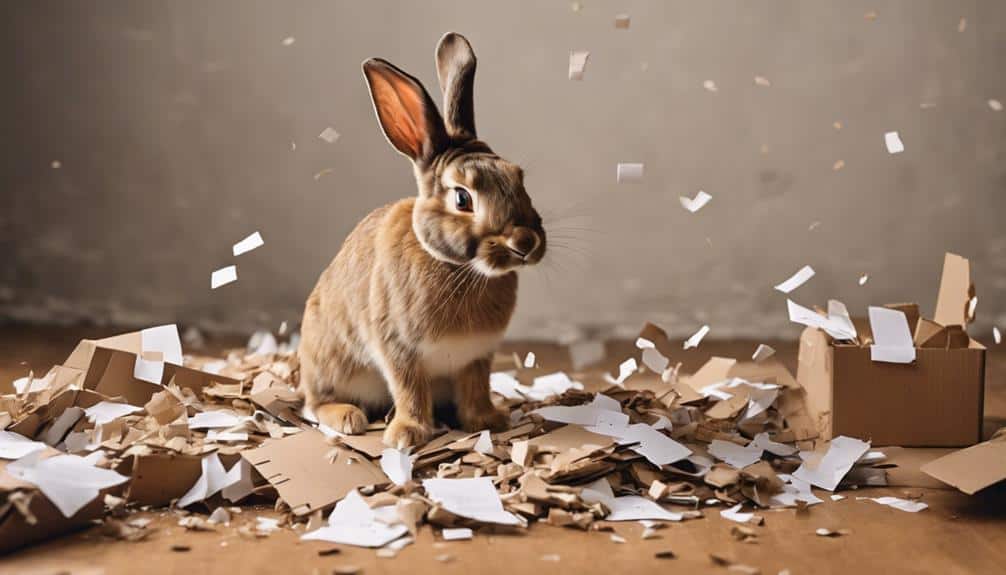
Bunnies instinctively chew on cardboard as a necessary behavior to maintain their dental health and mental well-being. Chewing on cardboard helps these furry creatures manage their fast-growing teeth, preventing dental issues that can arise if their teeth become too long.
Beyond dental care, cardboard chewing also provides rabbits with essential mental stimulation. It satisfies their natural chewing instincts, keeping them engaged and active. Introducing cardboard in their play areas can offer safe spaces for exploration, encouraging their natural behaviors.
Incorporating cardboard toys in their environment can prevent boredom and promote healthy habits. By monitoring their cardboard consumption and providing alternatives when needed, you can assure your rabbit's well-being. Understanding the significance of cardboard chewing in a rabbit's life allows you to cater to their needs effectively. Remember, offering appropriate outlets for this behavior is key to keeping your bunny happy and healthy.
Safe Types of Cardboard for Bunnies
When choosing cardboard for your bunny, opt for plain, untreated varieties free of ink or adhesive. This type of cardboard serves as a safe outlet for your rabbit's natural chewing habits.
Be cautious of glossy or colored cardboard that may contain harmful chemicals best avoided by your furry friend.
Safe Cardboard Options
Opting for untreated, plain cardboard free of inks or coatings guarantees safe chewing options for your bunny. Make sure to remove any tape, staples, or glue from the cardboard pieces before offering them to your furry friend. Keep in mind to monitor and limit the amount of cardboard consumed to prevent any potential digestive issues. If you observe excessive cardboard chewing, provide alternatives like paper or wooden toys to diversify their playtime. Additionally, cardboard can be utilized to create safe play areas and offer enrichment opportunities for your bunnies. Check out the table below for more details on safe cardboard options:
| Safe Cardboard Options | Description |
|---|---|
| Plain, untreated | Safe for chewing |
| Free of inks or coatings | Prevents ingestion of harmful substances |
| Tape, staples, glue removed | Avoid choking hazards |
| Limited consumption | Prevent digestive problems |
Potential Hazards to Avoid
To guarantee the safety of your bunny while allowing them to indulge in chewing activities, it's important to be mindful of potential hazards associated with the types of cardboard materials they interact with.
When selecting cardboard for your rabbits, opt for plain, untreated options without printed ink or adhesive to avoid ingestion risks. It's important to monitor and limit your bunny's cardboard consumption to prevent digestive issues.
Regularly inspect the cardboard for any signs of wear or ingestion to make sure your bunny's safety. If your rabbit shows excessive interest in chewing cardboard, provide alternative chew toys or materials to divert their attention.
Consider creating cardboard-based play areas to offer safe chewing and exploration opportunities for your bunnies.
Potential Dangers of Cardboard Consumption
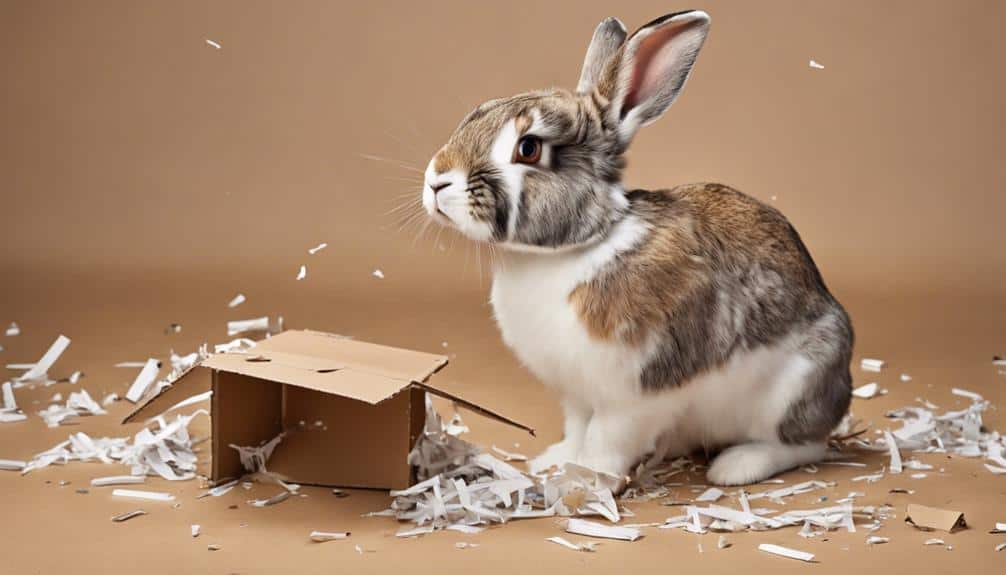
When allowing your bunny to chew on cardboard, be aware of the potential dangers it may pose.
Ingesting cardboard can lead to blockages in your rabbit's digestive system, which can be harmful.
To prevent health issues, consider safer chewing alternatives for your furry friend.
Cardboard Ingestion Risks
Consuming cardboard poses significant risks to a rabbit's health, including potential digestive blockages, injuries from sharp edges, exposure to toxic chemicals, and nutrient displacement.
When a rabbit eats cardboard or cardboard boxes, there's a risk of ingesting harmful substances present in the material. The sharp edges of chewed cardboard can lead to injuries in the rabbit's mouth or digestive tract, causing pain and potential health complications.
Additionally, the consumption of cardboard may result in the displacement of essential nutrients in the rabbit's diet, leading to deficiencies and related health issues. It's important to monitor a rabbit's interaction with cardboard closely to prevent these risks and assure the safety and well-being of your furry companion.
Digestive System Blockages
Ingesting cardboard poses a serious risk of causing digestive system blockages in rabbits. When rabbits eat cardboard, the small pieces can accumulate in their digestive tract, leading to potentially life-threatening complications. To prevent such issues, it's vital to be aware of the dangers associated with allowing rabbits to chew on cardboard. Here are three key points to bear in mind:
- Potential Hazards: Cardboard consumption can result in digestive system blockages due to the inability of rabbits to fully digest this material.
- Symptoms to Watch: Loss of appetite, lethargy, and reduced fecal output are warning signs that a rabbit may be suffering from a blockage.
- Urgent Care Needed: Immediate veterinary attention is necessary if you suspect your rabbit has ingested cardboard to prevent serious health consequences.
Safe Chewing Alternatives
To guarantee the safety of your rabbit's chewing habits, it's important to provide them with suitable alternatives to cardboard that promote dental health and mental stimulation.
While cardboard can be beneficial in moderation, there are potential dangers associated with overconsumption. Consider offering safe chewing alternatives such as chew toys, hay, wooden toys, or apple sticks to keep your rabbit engaged and maintain healthy teeth.
Monitor cardboard consumption closely to prevent digestive issues and avoid materials with harmful coatings or adhesives. Regularly inspect chew toys and alternative safe chewing materials for signs of wear or contamination to make sure your rabbit's well-being.
Alternatives to Cardboard for Bunny Chew Toys
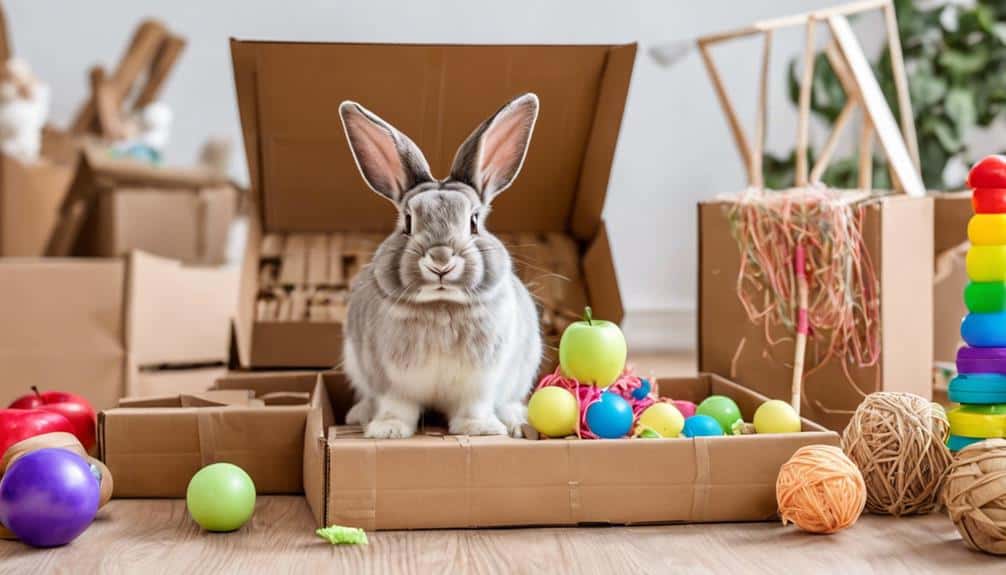
When considering alternatives to cardboard for bunny chew toys, paper emerges as a suitable option for wearing down rabbit's teeth without the associated risks. Paper can provide a safe and engaging chewing experience for your rabbit, helping to keep their teeth healthy and entertained.
Here are three alternatives to cardboard for bunny chew toys:
- Wooden Toys: Chewing toys, especially those made of wood, offer rabbits a safe and durable option for satisfying their natural urge to chew. Confirm the wooden toys are unpainted or use rabbit-safe paint like vegetable dyes to avoid any harmful chemicals.
- Pinecones: Natural items like applewood sticks or pinecones can be enjoyable and safe alternatives for rabbits to chew on. These items not only provide entertainment but also help in keeping your rabbit's teeth in good condition.
- Inked Paper: Avoid inked paper products and opt for plain or soy-based ink newspapers as safe alternatives. Inked paper may contain chemicals that could be harmful if ingested, so it's best to stick to safer options for your bunny's chewing pleasure.
Recommended Rabbit Chew Toys
Considering the importance of providing safe and enriching chew toys for your rabbit, exploring recommended options can enhance their dental health and overall well-being. Rabbit chew toys such as wooden blocks, apple sticks, and willow balls are important choices as they help satisfy their natural chewing instincts.
It's vital to offer a variety of textures and materials in chew toys to promote mental stimulation and maintain good dental health for rabbits. Safe chew toys like cardboard tubes, hay-filled balls, and woven grass mats are engaging options that cater to your rabbit's need for chewing. Remember to make sure that the chew toys are free from harmful chemicals, dyes, or small parts that could be ingested by your rabbit.
Regularly rotating and inspecting the chew toys won't only prevent boredom but also guarantee a safe chewing experience. By providing a range of safe chew toys, you can keep your rabbit entertained while supporting their dental health and mental stimulation.
Tips for Managing Bunny Chewing Behavior
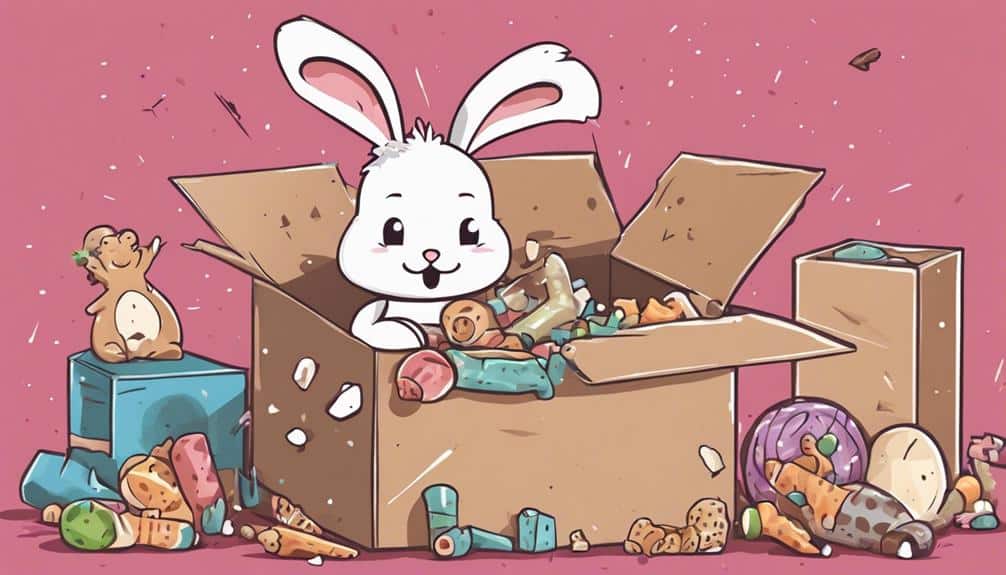
For effective management of your bunny's chewing behavior, carefully monitor their interaction with cardboard to prevent any potential health risks.
Here are three essential tips to help you manage your pet rabbit's chewing behavior effectively:
- Provide a Variety of Safe Chew Toys: Offer small pet rabbits a selection of safe materials such as wood toys or apple sticks to divert their chewing behavior away from cardboard. This not only helps guarantee against overconsumption but also promotes dental health and mental stimulation.
- Use Cardboard in Moderation: Introduce cardboard pieces in moderation to your pet rabbit as a form of enrichment activity. Monitoring their usage ensures they don't ingest excessive amounts, reducing the risk of blockages and other health issues.
- Inspect and Remove Hazardous Parts: Regularly check cardboard items for signs of wear, and remove any tape or staples that could pose ingestion hazards. Making certain the cardboard is intact and free from potential dangers safeguards your bunny's well-being.
Is It Safe for Bunnies to Ingest Cardboard While Making Dust Bunnies?
Bunnies are mischievous creatures, and they can’t resist nibbling on cardboard. While it may seem harmless, it’s important to monitor their chewing habits to ensure they don’t ingest large pieces. Remember, can dust bunnies move if they contain harmful materials. Always prioritize their safety.
Frequently Asked Questions
Is It OK to Put Cardboard in a Bunny Cage?
Putting cardboard in your bunny cage is a safe and beneficial choice. It serves as a suitable chewing and digging material, providing mental stimulation, preventing dental issues, and enhancing enrichment activities. Monitor consumption to avoid risks.
Can Rabbits Chew on Toilet Paper Rolls?
Yes, rabbits can chew on paper products like toilet paper rolls. They are safe alternatives for DIY bunny toys, aiding in natural chewing behavior. However, monitor for ingestion risks and remove any remaining paper for a safe chewing experience.
Does Cardboard Wear Down Rabbit Teeth?
Chewing on cardboard is an excellent way for rabbits to naturally wear down their teeth, aiding in dental health. It's a safe material that satisfies their chewing instincts. Incorporating cardboard into enrichment activities benefits rabbits' overall well-being.
How Do I Get My Rabbit to Stop Chewing Cardboard?
To help your rabbit stop chewing cardboard, distract them with safe chew toys, provide alternatives like untreated wood, use sprays to deter, bunny-proof with mats, and offer enrichment activities. Use training techniques with positive reinforcement.
Conclusion
Overall, cardboard can be a safe and beneficial option for bunnies to chew on. By providing appropriate cardboard and wooden toys, you can help maintain their dental health and keep them mentally stimulated.
Remember to monitor their interaction with cardboard, limit consumption, and avoid unsafe materials. For example, a rabbit named Luna was able to keep her teeth healthy and stay entertained by chewing on cardboard boxes and wooden toys provided by her owner.



